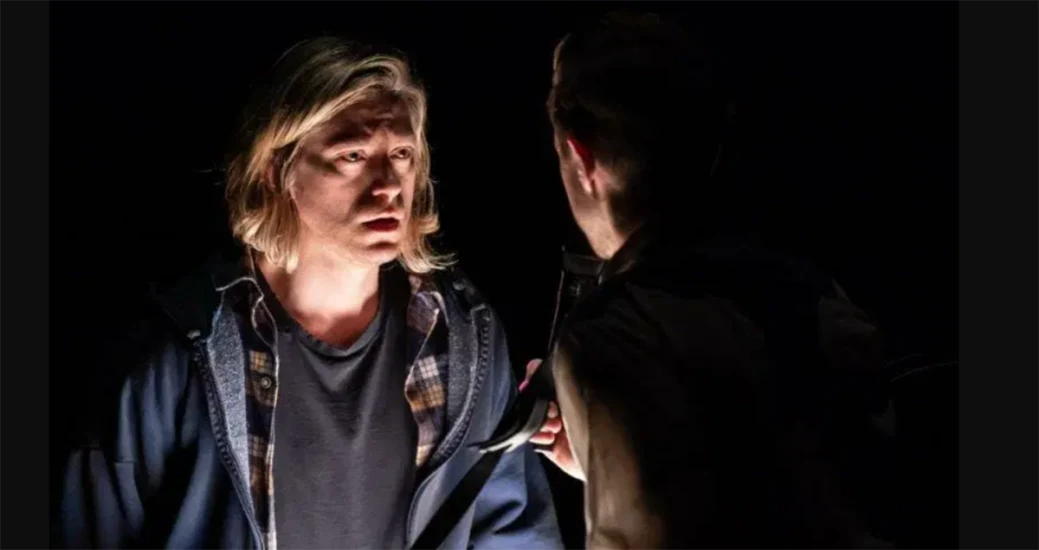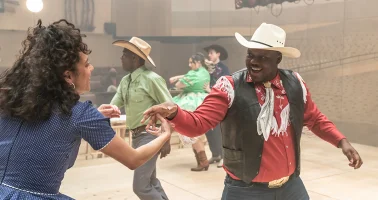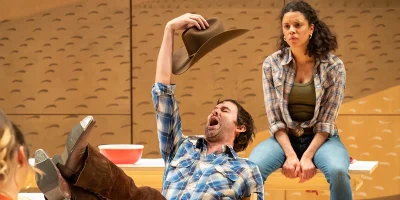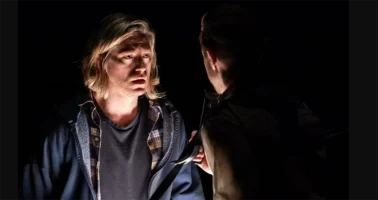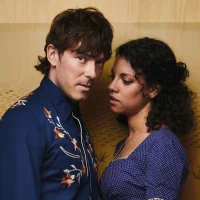
Patrick Vaill is not the typical villain in ‘Oklahoma!’
Fifth time’s the charm for Patrick Vaill, who makes his West End debut in Oklahoma! as Jud Fry, a role he’s performed in this production since university.
Patrick Vaill decided to be an actor when he saw a British production of a Rodgers and Hammerstein musical. It was Nicholas Hytner’s production of Carousel at Lincoln Center in 1994, and when Michael Hayden’s voice crescendoed on the iconic “Soliloquy,” Vaill immediately knew he had to perform.
Now, the New York native is coming full circle to make his West End debut in another Rodgers and Hammerstein musical: Oklahoma! While it’s his first time in the West End, it’s far from his first time in this show. Vaill began playing the misunderstood Jud Fry in director Daniel Fish’s Tony-winning production in 2007 at Bard University as a student.
The run at Wyndham’s Theatre, which goes until 2 September, marks his fifth time in the show. After Bard, he performed off Broadway at St. Ann’s Warehouse, on Broadway at Circle in the Square, and last year at the Young Vic in the London premiere. Sixteen years later, he’s still mining the depth of farmhand Jud Fry’s angst in the 1943 classic, and he even won the Evening Standard Award for Best Musical Performance at the Young Vic
“I always looked at London theatre as the paragon of the artform,” says Vaill. “And yet, it always feels out of reach, as an American actor, to get to come over here to work on the stage. And so when the opportunity presented itself, it seemed so above and beyond anything my meager mind could have ever dreamed of. So I leapt at it.”
Sitting in a coffee house in Covent Garden, Vaill reflects on what brought him to this moment, which began with a casting choice that surprised even him. The musical’s traditional antagonist, Jud Fry is typically played by a performer with a robust and intimidating presence, augmented by a deep, resounding baritone, broad shoulders, and an air of dark mystery. The list of actors who have played the role includes Shuler Hensley, Howard Da Silva, and Alfred Molina.
Vaill is that stereotype’s direct opposite: his shoulder-length hair is fine with expert blonde highlights, and he’s tall and lean with a gentle and welcoming presence. Wearing a deep green shawl-collared sweater, Vaill possesses a warm energy, and his striking cheekbones and piercing eyes are magnetic. He’s more inviting than brooding. And that paradox was something Vaill initially contended with when crafting his interpretation.
“[Jud] was never a character that was on my radar as a possibility for me because I didn’t identify with the kinds of actors that have gotten to play this role,” he says of getting cast at university. “I may have come in thinking that I had to play two performances: one as Jud Fry but the other as an actor who would be cast as Jud Fry. And [director Daniel Fish] let me be free of that second responsibility, of pretending to be somebody that I wasn't, that ultimately what I had to bring to it was enough.”
I’ve had the privilege of seeing Vaill perform in almost all of the previous iterations (save the Bard production), and each time, his work becomes deeper and more complex. Vaill’s Jud is astonishing, surprising, unsettling, and comes out of nowhere in a way that allows audiences to see the character in a new light and question the dynamics of the piece.
That’s the genius of a show like Oklahoma!, Vaill says, and what makes Daniel Fish’s production provocative and current. Dubbed “sexy Oklahoma!” during its New York outing with the hashtag #thisoklahomaf--ks, the show initially garnered acclaim for doing something different.
However, nothing has changed about the script or the iconic songs, like “Oh, What a Beautiful Morning,” “Surrey with the Fringe on Top,” and of course the titular number. But in this stripped-back, raw interpretation, it’s impossible not to see how the story of people contesting with each other and their government doesn’t relate to today’s headlines.
“I've done Oklahoma! in four different presidencies, which is crazy,” says Vaill, adding that the number of prime ministers is far greater. “And that's the sign of a great piece of writing is that it's always reflecting back at you. When something is so primal in what it’s about and simple in its execution, everyone’s going to see their reflection in it somehow, no matter what time, no matter what place.”
Oklahoma! falls squarely in the classic American musical theatre canon, so many British audiences might not have the same familiarity with the piece. On Broadway, Vaill notes, theatregoers came to the show with a very strong expectation of what they wanted the show to be, and contesting with that assumption created a really interesting tension.
Whereas, performing for London audiences has been more free, as people allow the production to be what it is. And no matter where you’re from, the story, which is ultimately about land boundaries, ownership, and class, is eerily prescient. London may not have the farmer and a cowman, as the song goes, but the prince and the pauper have had their own struggles.
“Questions of empire are deeply ingrained within this space,” Vaill says. “Western history is carnage and taking things that aren't yours and bad deals. And that's all in this play. That's in the song ‘Oklahoma!’ It's a bunch of people taking land that isn't theirs and saying, ‘We know we belong to the land.’ What a dark thing to say when it's actually not yours.”
Performing in London is a lifelong dream come true for Vaill, who came to the city often as a child with his parents to see theatre. He remembers watching Amadeus with David Suchet and Michael Sheen and seeing Alex Jennings in The Winters Tale and The Relapse in repertory, which Vaill describes as “one of those moments where you leave your body.”
When asked what it would mean to Vaill to give the audience at Oklahoma! that same experience he once had sitting in a London theatre, he blushes, the significance of this moment painted all across his face.
“One of the things that I love about theatre is that the art form is alive in its production, and what keeps these stories alive is passing on the baton and continuing to be the one to tell the story,” he says.
“There comes with it this wonderful sense of responsibility in caring for this piece, for this art form, and for these theaters. A custodianship of the art, but also a sense of belonging to a lineage that is very meaningful. You get to be a part of something very large.”
Book Oklahoma! tickets on London Theatre.
Photo credit: Patrick Vaill (Photo by Marc Brenner)
Originally published on
